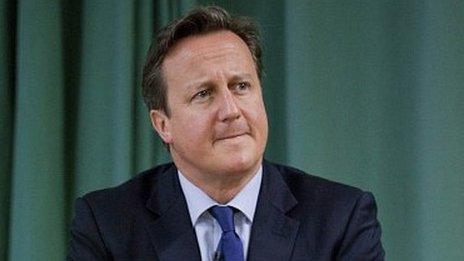UK told to pay £1.7bn extra to European Union budget
- Published
- comments
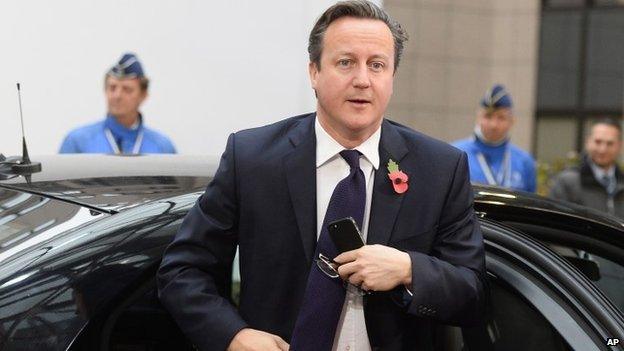
David Cameron is currently in Brussels meeting other European leaders
The UK has been told it must pay an extra £1.7bn (2.1bn euros) towards the European Union's budget because the economy has performed better than expected in recent years.
The payment follows new calculations by the EU that determine how much each member state should contribute.
It would add about a fifth to the UK's annual net contribution of £8.6bn.
A government source said the demand was "not acceptable" while one Tory MP said the UK should simply refuse to pay it.
UKIP leader Nigel Farage said the UK had been "hammered again" while Labour said it was imperative that the European Commission must reconsider the "backdated bill".
It comes at a time of increased pressure on David Cameron over Europe, with the Rochester and Strood by-election next month likely to be dominated by the issues of immigration and the UK's relationship with the European Union.
The recent electoral success of the anti-EU UK Independence Party - which is hoping to win the Rochester seat from the Conservatives - has prompted renewed calls for the prime minister to renegotiate the terms of the UK's relationship with Europe.
'Natural justice'
The BBC's political correspondent Ben Wright in Brussels says the demand for more cash - which the UK government only found out about last week - has infuriated the UK and will rile many backbench Conservative MPs.
Mr Cameron made no comment as he arrived for the second day of an EU summit in Brussels.
But the government source said: "It's not acceptable to just change the fees for previous years and demand them back at a moment's notice.

Analysis by Europe correspondent Chris Morris
For the prime minister, the timing could hardly be worse.
The European Commission has reviewed the economic performance of all member states since 1995, and revised its economic statistics to take greater account of things like income from the black economy.
The result is that the UK faces by far the largest extra payment. The Netherlands and Italy also have big bills to pay, and even a struggling country like Greece will see its contribution go up.
In contrast, both Germany and France will get rebates - €1bn for the French.
EU officials say it is a technical not a political decision, and it has been worked out under rules agreed by all member states.
But it will certainly add to political tensions about Europe in the UK, at a time when opinion polls say UKIP is on course to win its second parliamentary seat in Rochester and Strood next month.

"The European Commission was not expecting this money and does not need this money and we will work with other countries similarly affected to do all we can to challenge this."
Conservative backbencher John Redwood said the surcharge "offended all our principles of natural justice and fair taxation".
"It is a very large increase in tax on the British people charged retrospectively without their agreement," he told Radio 4's Today programme.
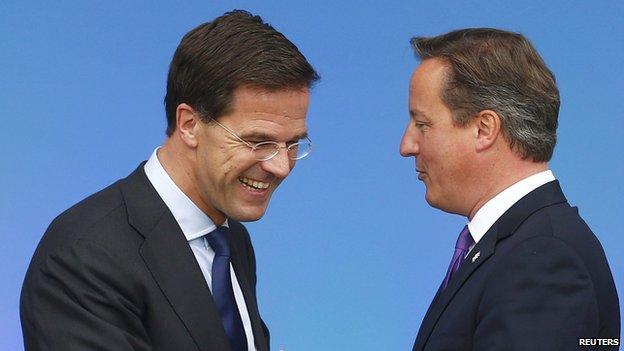
David Cameron and Mark Rutte, pictured at last month's Nato summit, are discussing the matter
He suggested the UK should simply refuse to pay the extra amount and that Parliament should be asked to pass a law declaring the payment illegal.
"The British people will not want to send another £1.7bn to the European Union by a very big majority and so the British government just says it won't pay,"
And his colleague Mark Pritchard said Mr Cameron should consider bringing forward a referendum on whether the UK should leave the EU, which David Cameron has promised in 2017.
The additional payment was requested after the European Commission's statistics agency, Eurostat, reviewed the economic performances of member states since 1995, and readjusted the contributions made by each state over the past four years based on their pace of growth.

Analysis by economics editor Robert Peston
How is it that our EU subscriptions are supposedly in arrears?
Well you may recall that the Office for National Statistics recently recalculated the size of our national income to take account of unreported or under-reported parts of the economy, such as research and development, illicit drugs and prostitution.
So thanks in part to the inclusion in the official economy of our productive sex workers, our EU membership fee has been augmented.
Now to be absolutely clear, none of this is a surprise to the Treasury or chancellor. British officials have known for some time that the inflammatory demand from Brussels was coming.
What did catch them by surprise was what it sees as a deliberate leak by EU officials of the news last night - which they see as an attempt to embarrass David Cameron, as he meets other EU leaders to discuss, among other things, his controversial hopes of being able to restrict migration of EU nationals to Britain.

Under the new calculations, the UK and the Netherlands are both being asked to pay more on 1 December, while France and Germany are both set to receive rebates.
The UK receives an annual rebate on its EU contribution under an agreement secured by Margaret Thatcher in the 1980s.
In 2013, the rebate was worth £3.32bn, while £5.2bn was also deducted from the UK's overall £17.1bn contribution to reflect payments to UK businesses for agriculture, rural development and regional infrastructure.
Mr Cameron is meeting his Dutch counterpart Mark Rutte to discuss how they might challenge the surcharges, amid suggestions the Netherlands may consider taking legal action.
The president of Lithuania Dalia Grybauskaite has defended the process. "Each year we have a final revision of the budget, because the payments are based on a prognosis," she said.
"So at the end of the year the [European] Commission revises, and some countries have to pay back."
'Senseless'
The leader of the Conservative MEPs, Syed Kamall, said the UK was being penalised for its austerity measures.
"The European Commission is penalising Britain for taking tough decisions, putting in place a long-term economic plan and for having the most successful economy in the EU, while actually rewarding France for being an economic basket case," he said.
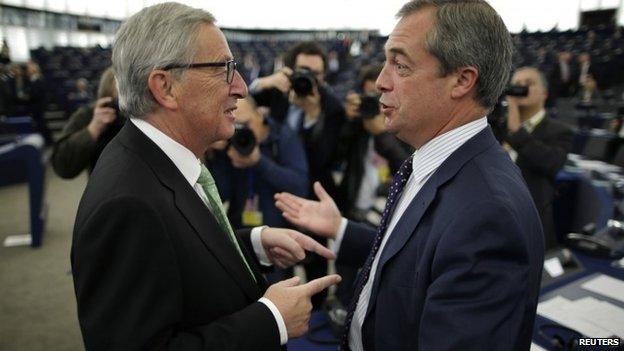
Nigel Farage has likened the EU to a "thirsty vampire"
And UKIP's Nigel Farage said the cash demand would add to the UK's already substantial budget deficit and he would "not pay a penny" to the European Union.
"The EU is like a thirsty vampire feasting on UK taxpayers' blood," he said. "We need to protect the innocent victims, who are us."
Labour said David Cameron should work with allies in Europe to put pressure on the European Commission to reconsider.
"It is imperative that David Cameron now urgently discuss this with other member states, and urges the incoming EU Commission to look again at the proposed change," said its shadow Europe minister Pat McFadden.
And Liberal Democrat MEP Catherine Bearder said the timing of the EU's request was "senseless".
"Just as pro-EU sentiment in UK reaches a 23-year high, Commission clumsily gives eurosceptics an open goal with budget request," she tweeted.
A request by Tory MP Andrew Turner for a government minister to answer an urgent question in the Commons about the EU demand has been declined by Speaker John Bercow.
- Published24 October 2014
- Published23 October 2014
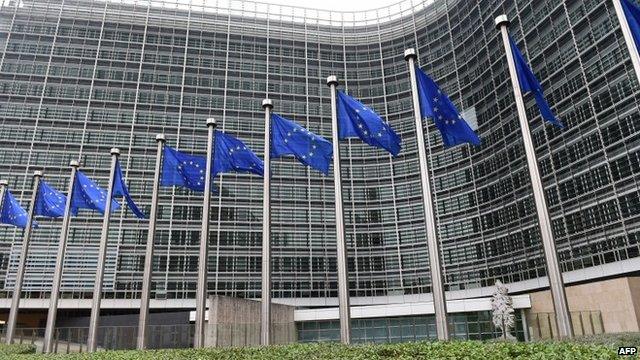
- Published20 October 2014
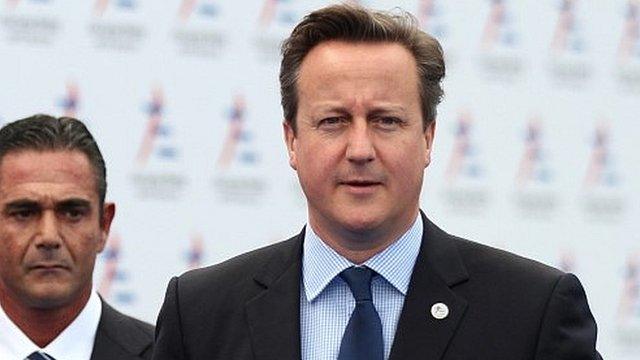
- Published16 October 2014
